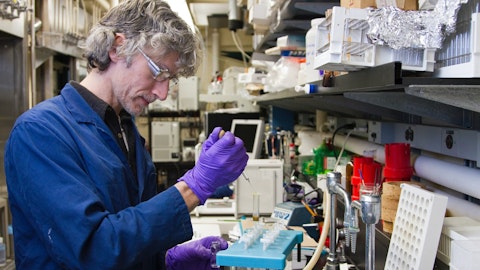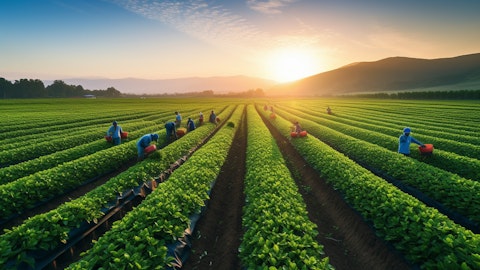Arcadia Biosciences, Inc. (NASDAQ:RKDA) Q1 2024 Earnings Call Transcript May 9, 2024
Arcadia Biosciences, Inc. beats earnings expectations. Reported EPS is $-1.78, expectations were $-2.52. RKDA isn’t one of the 30 most popular stocks among hedge funds at the end of the third quarter (see the details here).
Operator: Thank you for standing by. My name is Parilla, and I will be your conference operator today. At this time, I would like to welcome everyone to the Arcadia Biosciences Q1 2024 Financial Results and Business Highlights Conference Call. All lines have been placed on mute to prevent any background noise. After the speakers’ remarks, there will be a question-and-answer session. [Operator Instructions] Thank you. I would now like to turn the conference over to T.J. Schaefer, Chief Financial Officer at Arcadia. Please go ahead.
T.J. Schaefer: Thank you, and good afternoon. Joining me on the call today is Stan Jacot, Arcadia’s President and Chief Executive Officer. This call is being webcast and you can refer to the company’s press release at arcadiabio.com. Before we start, we would like to remind you that Arcadia Biosciences will be making forward-looking statements on this call based on current expectations and currently available information. However, since these statements are based on factors that involve risks and uncertainties, the company’s actual performance and results may differ materially from those described or implied today. You can review the company’s safe harbor language in our most recently filed 10-K. With that, I’ll now turn the call over to Stan.
Stan Jacot : Good afternoon everyone, and thank you for joining us today to review our first quarter results for 2024. Since we last talked six weeks ago, I am pleased to report that the positive business trends from Q4 2023 have continued in Q1 2024. Revenue continues to grow both sequentially and year-over-year. Our gross profit margins have been greater than 30% for five consecutive quarters. Operating expenses continued to decline at a double-digit pace versus last year. All of these factors have contributed to Q1 2024 achieving the lowest loss from continuing operations in over six years. Let’s now turn our attention to GoodWheat. The GoodWheat brand continues to expand with Q1 adding a couple of hundred stores of distribution on pancake and waffle mixes.
Our focus continues to be nurturing our existing point of distribution and building success stories by category. There are plans in place for each customer addressing everyday pricing, promoted pricing, shelf placement, SKU expansion and account specific marketing. These plans require a significant expense to execute, but are necessary in order to achieve brand scale and defend shelf space from fierce competition. On our last call, I mentioned several accolades our GoodWheat brand had received from some significant publications including Better Homes and Gardens and the website Eat This Not That. And I want to share another accolade that GoodWheat has received from a customer. In Q1, we launched GoodWheat Mac & Cheese nationwide on Amazon in three varieties: Basket Cheddar, White Cheddar and Three Cheese.
At Amazon, recently selected GoodWheat Three Cheese Mac & Cheese as an Amazon’s Choice, new arrival pick. This designation is solely driven by Amazon’s criteria, which includes being highly rated, well priced, and available to ship immediately. This is one more example from an independent source that proves that we already know that our proprietary wheat is commercially viable to create great tasting products, while taking in more fiber and protein. To reiterate, our business model includes expanding the use of our wheat technology into food products beyond GoodWheat. There are thousands of products across the grocery store and in food service that can offer these same viable benefits. So we see a long-term path to generate recurring royalty revenue.
We have been actively pursuing two key steps to monetizing this technology. One, partner with a wheat supply chain in order to produce a scalable, cost-effective identity preserved wheat supply. We need our wheat technology integrated into all customer preferred wheat varieties and then efficiently move from seed to farm to mill to deliver flour. We are currently in final discussions with potential partners and hope to update you soon. In parallel, the second step is to work with large food manufacturers to create a demand for our wheat. This can create a long-term pull-through partnership to ensure we have enough volume through our supply chain system. Conversations are underway across several categories, and it will take some time to develop products with their R&D groups.
Now let’s move to Zola Coconut Water. The coconut water category continued to perform well in Q1 2024, with unit sales and dollar sales, both increasing 10% versus one year ago, according to Nielsen data for the 13 weeks ending March 30, 2024. Zola momentum is continuing. In the latest four weeks ending March 30, 2024, showed Zola growing 15% in dollar sales and 14% in unit sales. Zola is back to growing share in the category and we are optimistic that this double-digit growth will continue in 2024 for a couple of reasons. One, our flavor innovation will begin shipping in Q2 adding more variety to Zola’s naturally hydrating lineup. Original lime and pineapple flavors and the new 16.9-ounce resealable Tetra Pak container have been well received by retailers as pineapple is the number one coconut water flavor and lime is the number one flavor in sparkling water.

Two, we have confirmed several new accounts that will be adding Zola to their single-serve beverage set in the produce section. The store count for this new distribution is nearly 1,300 stores, bringing our total store count for Zola to over 3,300 by the end of Q2. Our focus will be to ensure these new stores can quickly achieve the same velocity and dollar sales as our current retailers enjoy. So we expect Zola to be a key growth driver for us in the future for both revenue and gross profit and we will continue to explore the next wave of consumer-preferred innovation. The last initiative to discuss today is the strategic review announced last year which stated that Arcadia would explore a range of strategic options, which could include an asset sale, acquisition, merger sale or other strategic transaction.
Since that time, we along with our bankers have engaged with a significant number of potential transaction partners to find the best outcome for Arcadia and our shareholders. And while we aren’t ready to provide a detailed update today, we continue to have discussions and perform the due diligence work necessary to accelerate our ability to monetize our IP and deliver cash flow positive results. We will keep you updated as material events occur and we must point out that there can be no assurance that this exploration of strategic alternatives will result in the company entering or completing any transaction and no timetable has been set for the conclusion of the strategic review. As discussed in our last call, we anticipated our 2024 net operating loss to be under $10 million for the first time in the company’s history.
Our Q1 performance and trend has met our expectation in order to deliver that objective and we plan to grow revenue optimize margins and reduce operating expenses for the remainder of 2024 in order to achieve this goal. With that, I’ll turn the call over to T.J. to discuss our Q1 financial results. T.J.?
T.J. Schaefer: Thank you, Stan and good afternoon to everyone joining us on the call today. Before I begin, I would like to remind everyone that all comparisons to our prior year results exclude the impact of our Body Care brands which were discontinued in September 2023. With that, let me walk through our results for the first quarter of 2024. Revenues of approximately $1.3 million increased 7% sequentially and 2% compared to the same period last year. The quarter-over-quarter improvement was attributable to a 28% increase in Zola, as Q4 is seasonally the softest quarter for coconut water. Our year-over-year growth was primarily driven by GoodWheat and Zola sales, partially offset by higher costs associated with new distribution.
Gross profit of $435000 was slightly below the prior quarter and prior year due to product mix, but still resulted in a very healthy gross margin of 35%. And as Stan mentioned earlier, this is our fifth consecutive quarter delivering gross margins in excess of 30%, which is a testament to the progress we have made in delivering high-quality revenue. Research and development expenses of $272000 declined 18% quarter-over-quarter and 24% year-over-year due to the timing of innovation work following the launch of new GoodWheat categories, as well as new Zola flavors. Selling, general and administrative expenses of approximately $3.2 million decreased 7% versus Q4 2023 and 22% compared to the same period last year, as we rightsized the organization and our marketing investment.
Total operating expenses of $3.5 million improved 9% sequentially and 21% year-over-year, resulting in a loss from continuing operations of approximately $3.1 million, which is the lowest level in the past six years. From a balance sheet perspective, we ended the quarter with $8.5 million in cash and short-term investments which is $3.1 million below our Q4 2023 ending balance. As we stated on our last earnings call, we believe our use of cash will be in the single digits, and we continue to hold to that guidance. However, our use of cash will be more heavily weighted towards the first half of the year driven by larger cash payments related to employee bonuses and insurance. Our inventory balance stood at $5 million at the end of Q1 2024, of which 84% was GoodWheat.
We will continue to work down these balances as we focus on driving velocities in existing stores versus new distribution. In summary, Q1 continued the positive momentum we’ve achieved over the past few quarters. Our revenue grew quarter-over-quarter and year-over-year. We have achieved gross margins in excess of 30% for five straight quarters. At the same time, we have reduced our operating expenses by 21% or nearly $1 million, which has resulted in our loss from continuing operations being at the lowest level in six years, and we estimate our use of cash to be in the single digits for the first time since Arcadia went public in 2015. So, while we still have plenty of work to do in order to achieve positive cash flow results and deliver value to our shareholders, we are very pleased with the progress we made in Q1.
I will now turn the call over to the operator for questions.
See also 25 Best Conservative Email Newsletters to Subscribe to and 12 Best Gig Economy Stocks To Buy.
Q&A Session
Follow Arcadia Biosciences Inc. (NASDAQ:RKDA)
Follow Arcadia Biosciences Inc. (NASDAQ:RKDA)
Receive real-time insider trading and news alerts
Operator: Thank you. We will now being the question-and-answer session. [Operator Instructions] Your first question comes from the line of Ben Klieve with Lake Street. Please go ahead.
Ben Klieve: Hi. Thank you for taking my questions. First, a couple of questions around the expenses associated with the GoodWheat expansion that you both noted in your prepared remarks. I’m wondering, first, if you can kind of help characterize the magnitude of the associated expenses and the impact on gross profit during the first quarter?
Stan Jacot: Yeah, thanks, Ben, for calling in. And I’m actually going to turn that over to T.J. to answer that question.
T.J. Schaefer: Yeah, Ben. So a lot of the upfront investment is around promotions and slotting. But as we’ve noted previously, our overall marketing investment will come down significantly relative to prior quarters or prior years as we focus more on our existing customers and again, driving those velocities versus new distribution into new stores.
Ben Klieve: Okay. That’s helpful. So I think you’ve kind of answered my follow-up question, but we’ll ask it anyways here around kind of the trajectory of these costs throughout this year. So it sounds like you’re saying you think these — the cost associated with these initiatives that you just outlined T.J. are going to be potentially ramping down here into the second quarter and third quarter? Or are they going to stay at the kind of a consistent run rate from the first quarter levels?
Stan Jacot: Yes. Ben, it will probably start to ramp down by Q4.
Ben Klieve: Okay. Very good. That’s helpful. Thanks, Stan. And then you talked about your focus on kind of nurturing existing retail relationships, today something you’ve talked about for the past couple of quarters as being a focus throughout 2024. I’m wondering if you could just talk on a high level about kind of the early results thus far in this process. Are you happy with the kind of progression of the relationship that you have with your existing retailers? Are there things that are going uniquely well? Or are there challenges that are still in place? Is there anything you can elaborate on regarding the strategy would be great.
Stan Jacot: I’d say the results are mixed Ben. We do have some high spots with some retailers but there are some retailers who are really still struggling to execute the plan that we’ve laid out. And again, there’s a variety of reasons behind it. It differs by account. Sometimes it’s a change in the buyers, sometimes, it’s resistance to either changing the planogram or adding SKUs. Other times it’s the difficulty in securing promoted prices. So it is — but I would say it’s mixed at this point. It is difficult and competitive in these markets.
Ben Klieve: No, fair enough. There’s no doubt about that. Okay. Very good. We’ll look forward to updates on that then in coming quarters. And then last one for me is on Zola. You guys seem pretty enthusiastic about the opportunity here from expanding your the SKU count with new flavors and also expansion of single serve. Can you kind of characterize the — kind of your vision for Zola progression here throughout this year and especially in the 2025 as all of these initiatives begin to scale. Is this something that’s going to be — ultimately, I’m trying to understand if Zola is going to be really a revenue driver above and beyond GoodWheat here in coming quarters given these initiatives?
Stan Jacot: Yes, I think that’s a fair characterization. The Zola is going to be the majority driver of revenue, and in particular, gross profit growth. And part of the reason for that is because the growth that we have in Zola doesn’t come with the same kinds of costs. It’s a much different category in that produce set, in terms of selling dollars required and promoted dollars required.
Ben Klieve: Got it. Okay. Very good. Well, best luck rolling all those initiatives out of Zola. Thanks for taking my questions and I’ll go back in queue.
Operator: Thank you. And there are no further questions at this time. I will now turn it back to Stan Jacot for closing remarks.
Stan Jacot: Thank you. So in conclusion, Arcadia is continuing its positive trajectory. We have transitioned the top line to high-quality revenue that generates gross profit across multiple sources. We have rightsized the organization and streamlined our cost structure in order to extend the runway. Our GoodWheat is in more than 3,500 stores in three categories and Zola Coconut Water is positioned for double-digit growth with new flavors and new distribution. And finally, we remain focused on monetizing our IP and accelerating delivery of cash flow positive results. We look forward to updating you in the future. Thanks again for joining us and have a great rest of your day.
Operator: Ladies and gentlemen, that concludes today’s call. Thank you all for joining. You may now disconnect.
Follow Arcadia Biosciences Inc. (NASDAQ:RKDA)
Follow Arcadia Biosciences Inc. (NASDAQ:RKDA)
Receive real-time insider trading and news alerts



